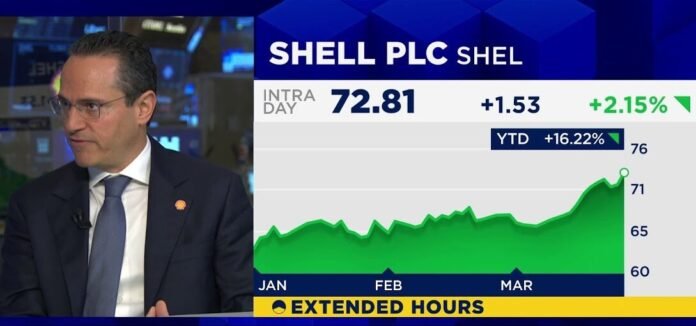Shell cuts green investment and ramps up fossil fuel production, rewarding CEO Wael Sawan with a hefty bonus.
Shell has unveiled a controversial new strategy that will see it increase fossil fuel production, reduce its commitment to green energy, and slash costs—while handing its chief executive, Wael Sawan, a significant pay rise.
The oil giant confirmed on Tuesday that Sawan’s total pay package for last year has been boosted to £8.6m, up from £7.9m in 2023. Environmental groups have slammed the move as “obscene,” especially as it comes alongside Shell’s decision to halve its investment in renewable energy.
More Oil, Less Climate Action
At a capital markets meeting in New York, Sawan outlined plans to increase Shell’s oil and gas production by 1% annually until 2030—reversing its previous commitment to gradually cut output by up to 2% per year. Additionally, the company aims to expand its liquefied natural gas (LNG) operations by 4-5% annually.
This strategy flies in the face of global climate targets, which demand a 45% reduction in carbon emissions by 2030 to limit catastrophic warming. Despite this, Shell is cutting its projected investment in low-carbon energy from 20% of its total capital expenditure to just 10%.
Billions for Shareholders, Billions in Cuts
Alongside its renewed focus on fossil fuels, Shell is planning deep cost-cutting measures. The company intends to strip out between $5bn and $7bn annually in operating costs by the end of 2028 while capping its spending at $20bn-$22bn a year for the next three years.
However, this belt-tightening does not extend to its shareholders. Shell has committed to paying out a staggering 40-50% of its operational cash flow to investors, up from its previous 30-40% range. In 2024 alone, the company handed $8.7bn in dividends to shareholders and spent $13.9bn on stock buybacks.
Criticism Mounts Over ‘Obscene’ CEO Pay
Environmental groups and activists have condemned Shell’s moves, particularly Sawan’s growing pay package. Under his leadership, the company has not only rolled back its climate commitments but also cut hundreds of jobs in its low-carbon division.
Patrick Galey of Global Witness slammed the pay hike, calling it a “slap in the face” to millions suffering from climate disasters fueled by fossil fuel emissions.
“Instead of allowing oil giants to hand out billions to wealthy shareholders and shower their bosses with lavish pay cheques, governments should be making them pay for climate damages,” Galey said.
Shell’s Emissions Remain Staggering
According to Shell’s latest annual report, its carbon emissions remained at around 1.2 billion metric tonnes of CO₂ equivalent last year. The bulk of these, 1.1 billion tonnes, came from Scope 3 emissions—those generated when consumers burn Shell’s fuel. This figure is more than double the total emissions produced by the entire United Kingdom.
A Future Built on Fossil Fuels?
Despite mounting pressure to pivot toward clean energy, Shell remains committed to oil and gas. Sawan has even hinted that if his strategy fails to boost Shell’s valuation, the company may consider shifting its stock listing to the U.S., where fossil fuel giants often command higher investor confidence.
With Shell’s stock price outperforming many of its European rivals, Sawan remains confident in his approach. He told investors, “It comes down to confidence. Confidence that through performance, discipline, and simplification, we will deliver what we say.”
However, critics argue that Shell’s real confidence lies in fossil fuels—at the expense of the climate and future generations.
